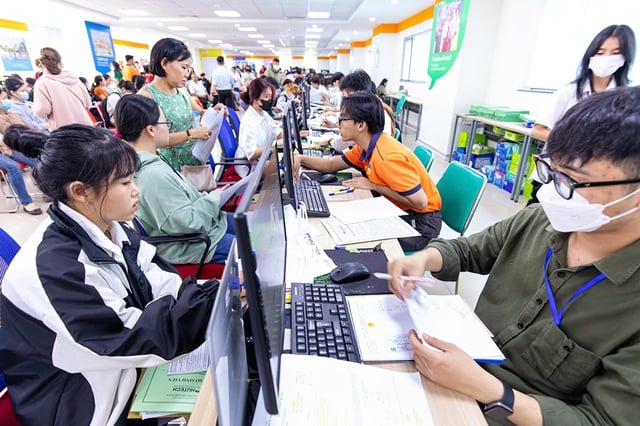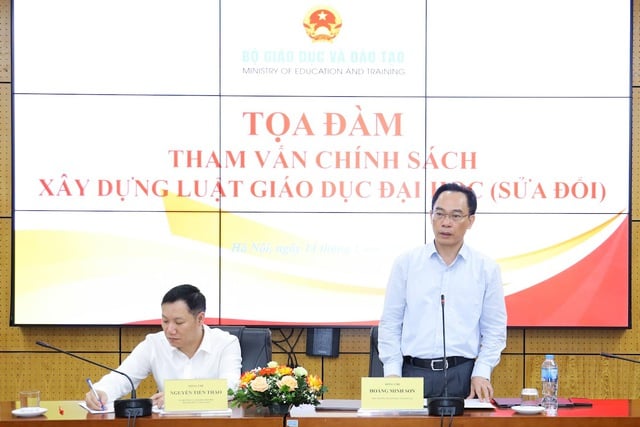According to Mr. Nguyen Tien Thao, Director of the Higher Education Department - Ministry of Education and Training, the drafting committee plans to submit to the Government six main policy groups as a basis for amending the law, including: improving the effectiveness of state management and creating an advanced university governance system; modernizing curricula and training methods, applying advanced technology and promoting lifelong learning; positioning higher education institutions as centers for research and innovation linked to training high-quality human resources; strengthening the mobilization of resources and improving the efficiency of investment in modernizing higher education; developing a team of excellent lecturers and scientists and a creative, honest academic environment; and changing the approach to quality management in quality assurance activities.
Tuition fees are calculated accurately and fully within the prescribed framework.
The issue of tuition fees (HP) was included in group 4 (strengthening the mobilization of resources and improving the efficiency of investment in modernizing higher education) by the drafting committee of the revised law. Mr. Nguyen Tien Thao stated: "The financial policy for higher education will be comprehensively reformed towards efficiency, transparency, and ensuring equitable access. The law is expected to establish a tuition fee mechanism linked to training quality, while expanding support policies for students through preferential credit, regardless of whether they are public or private institutions. Besides state budget funding, higher education institutions, both public and private, will be given opportunities to diversify revenue sources through public-private partnerships (PPP), research activities, service provision, and socialized funding. In particular, the mechanism for allocating public funds will shift strongly from regular disbursements to investment based on output results, linked to objective evaluation criteria and strict monitoring mechanisms, in order to promote healthy competition and improve the efficiency of resource utilization throughout the system."

The revised Higher Education Law is expected to establish a tuition fee mechanism linked to the quality of training, and expand policies to support students through preferential loans, without distinction between public and private institutions.
PHOTO: DAO NGOC THACH
From the above perspective, the drafting committee of the revised law of the Ministry of Education and Training plans to include in the law provisions on unified principles regarding tuition fees, scholarships, and preferential credit, and entrust the Government and the Prime Minister with the responsibility of specifying the details. Specifically, the following is planned: universities will accurately and fully calculate tuition fees to ensure quality according to the framework stipulated by the Government; the State will implement tuition fee exemptions and reductions for policy beneficiaries; ensuring that all students from disadvantaged backgrounds have access to preferential credit to cover their study costs, preventing anyone from losing opportunities due to financial factors; the State will provide scholarships with matching funds from higher education institutions to attract students, especially talented individuals, to study in fields and training levels that are prioritized nationwide or regionally, without being tied to specific employment locations.
This is accompanied by a scholarship policy. The State prioritizes tuition fee exemption and scholarships for students studying teacher training programs and key sectors that contribute to the strategic socio-economic development.
GLOBALIZATION IN HIGHER EDUCATION AND THE LABOR MARKET
Policy Group 2, focusing on modernizing training programs and methods, applying advanced technology, and promoting lifelong learning, also proposed several noteworthy points. The Ministry of Education and Training's perspective is that reforming training programs and improving training quality should primarily aim at the goal of globalization in higher education and the labor market.
Higher education activities will be organized flexibly in a credit-accumulation manner, meeting the diverse learning needs and lifelong learning of students. The law will stipulate that training forms include full-time and part-time. Full-time training involves concentrated, full-time study at registered locations, following a standard study plan to complete the training program. Part-time training, on the other hand, offers flexible schedules and study plans, tailored to the conditions, needs, and abilities of learners to complete the training program.

Deputy Minister of Education and Training Hoang Minh Son speaks at the seminar.
Photo: Tran Hiep
Universities develop training programs that are consistent with the Vietnamese National Qualifications Framework and meet the training program standards of the respective ngành (field), nhóm ngành (group of fields), lĩnh vực (areas) or lĩnh vực (areas) and level. Universities also have autonomy in determining enrollment quotas, methods, and admission procedures in accordance with their training capacity, based on meeting the standards of higher education institutions, training program standards, and human resource needs.
The Ministry of Education and Training continues to issue regulations on admissions, which stipulate the admission methods; implement admission quotas, and ensure the quality standards for admission to teacher training, law, and health science programs; and require objectivity, transparency, fairness, and quality in the admissions process.
Specifically, the law will stipulate that the recognition and transfer of learning outcomes will be implemented when learners meet the output requirements of certain corresponding modules in the training program. The accumulated learning outcomes of learners will be considered for recognition and transfer between different levels, forms, and methods of training, facilitating articulation and lifelong learning.
According to Deputy Minister of Education and Training Hoang Minh Son, the drafting of the revised law is based on the following principles: fully institutionalizing the Party and State's policies on the development of higher education; conforming to the Constitution, inheriting and overcoming legal obstacles in practice; strengthening autonomy coupled with accountability; innovating governance, improving quality, and serving the community; encouraging socialization, international integration, and digital transformation; approaching international trends, developing open education, and lifelong learning.
Source: https://thanhnien.vn/se-thiet-lap-co-che-hoc-phi-gan-voi-chat-luong-dao-tao-185250514224257505.htm











































































































Comment (0)